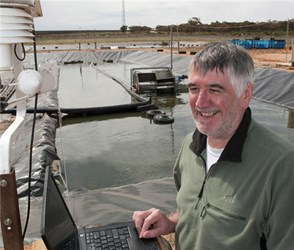Wastewater Treatment System To Help Farmers In Asia

An innovative wastewater treatment system that uses algae to clean water has proven to increase irrigation efficiency in rural communities at relatively low cost.
The system was developed in 2014 by a group of Flinders University researchers led by Professor Howard Fallowfield (pictured) in South Australia and is smaller, faster, and more efficient than conventional systems.
It has recently received approval by the South Australian Department of Health Wastewater Management and is being targeted for use by farming communities in China and South East Asia.
“Now that it’s actually been independently validated and we know that it works under this set of conditions it means it can actually be rolled out,” said Flinders University lecturer Michael Taylor.
“What that means is that for a little community you can actually treat your own wastewater without ongoing contamination issues. If you were discharging into a stream, you can divert it all to one of these low cost systems and actually be able to produce safe, good quality wastewater that you may be able to irrigate crops with.
“It also means that in remote and rural communities, not just in Australia, but in China as well, you can design and put one of these things in that runs very stably without a lot of maintenance and input.”
Contemporary wastewater systems require an intensive aeration sequence that uses outboard motors to oxygenate the water and can take up to 65 days to complete the treatment.
The Flinders University model occupies about 40 per cent of the space required by other systems and reduces the run time to 5-10 days using algae instead of fossil fuels.
This allows the water to naturally treat itself by increasing the alkalinity in the water and speeds up the aeration process, which allows aerobic bio-degradation of pollutants.
One of the main issues with modern systems is the high level of evaporation during treatment, but the Flinders model works fast enough that only a minimal amount is lost. The lack of evaporation and high quality of treated water makes it is perfect for farmers in rural areas of South East Asia who experience hot summers.
The system can receive about 12,000 – 14,000 litres of wastewater from local communities a day with the potential to churn out three times that amount depending on the amount of wastewater.
The total cost can range from $100,000-$200,000 to build, a fraction of other similar systems. The majority of the cost is in the excavation and lining of the pond with a geotextile material to prevent the water from escaping.
“There has been significant interest through South East Asia, especially in places where there is a lot of agriculture and water is a precious resource,” Dr Taylor said.
“Any time you reuse water, it obviously saves money and you have a better environmental flow because the discarded water is used for a valuable purpose.”
The combination of speed and the chemical effect of algae in disinfecting wastewater make this system exceptional compared to contemporary models.
“South Australia has gone quite a way to deal with the issue of wastewater,” said Water Industry Alliance CEO Andy Roberts.
“We are starting to get better at quantifying the benefits that we can achieve from these treatments. It’s not just about treating wastewater, which has a public health and environmental benefit, but it also has an increasing commercial benefit from irrigation as well.
“There are other places in the world that are far less advanced in that. It is excellent to see these technologies and their contributions. They are crucial to dealing with some of the challenges in other parts of the world.”
Flinders researchers also work closely with health professionals and academics from China’s Hunan University who are interested in the technology.
PhD students are sent from the Chinese institution for exchange in South Australia and work with the systems.
South Australia’s capital Adelaide has three-long standing public universities, Flinders University, University of South Australia, and the University of Adelaide, each of which are consistently rated highly in the international higher education rankings.
Source: The Lead South Australia
